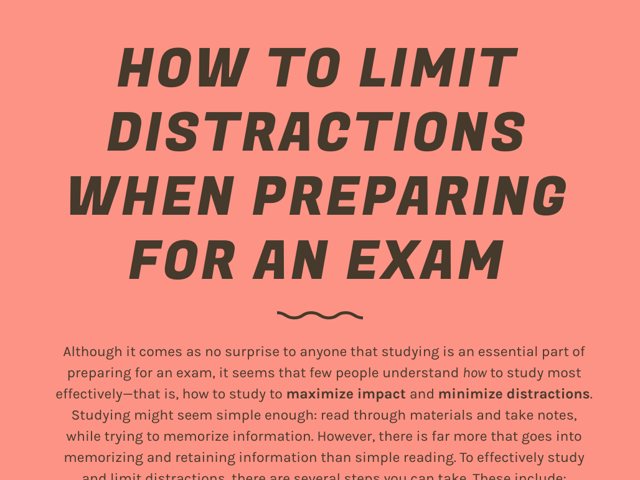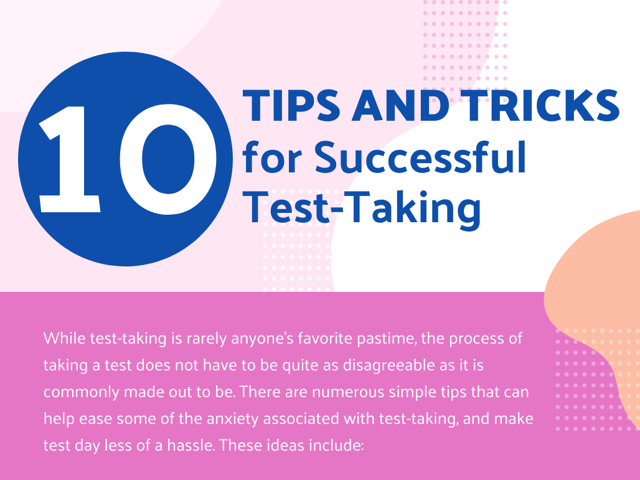
Limit Distractions When Preparing for an Exam
Although it comes as no surprise to anyone that studying is an essential part of preparing for an exam, it seems that few people understand how to study most effectively—that is, how to study to maximize impact and minimize distractions. Studying might seem simple enough: read through materials and take notes, while trying to memorize information. However, there is far more that goes into memorizing and retaining information than simple reading. To effectively study and limit distractions, there are several steps you can take. These include:
1. Identify and Take Care of Physical Needs Before You Begin
Make sure you have some water beside you as you study. Include a snack if you find yourself needing a bit of food while you work. Avoid unhealthy fats and unnecessary sugars, in favor of smaller items, such as nuts, seeds, fruit, or vegetables. Visit the bathroom, as well, and make sure you are wearing comfortable clothes.
2. Find a Comfortable Location
If you find yourself fidgeting, shifting, or constantly moving yourself or your study materials around, you are clearly not in an ideal study place. Before settling in, make sure you can be comfortable physically (you have plenty of back and leg support, and you are not cramped or pinched), and make sure you have plenty of room to spread out your study materials. While a couch might be more comfortable physically, your lap is unlikely to have all of the real estate necessary to spread out your study materials.
3. Gather Your Materials
Study materials vary from person to person and subject to subject; a math exam might require a book, a pencil, scratch paper, and a calculator, while studying for anatomy and physiology may require a book, a notebook, a highlighter, and a pen. Identify the study materials you need to successfully work through your material, and gather all of them before you sit down.
4. Communicate Boundaries
Studying can be a solitary activity, or it can be done in pairs or groups. In both cases, however, it is wise to communicate your intentions to the people you live with, or the people with whom you study. If you live with family or roommates, a simple, “I’m going to be studying. I’ll see you when I’m done!” will suffice. If you are studying in a group or as one half of a pair, you can say, “I want to focus on this and knock it out, so if we start to get off track, I’m going to pull us back to the subject, okay?” Both communicate your intentions firmly, but kindly.
5. Leave Your Phone in Another Room
In this day and age, many people feel as though they’ve all but lost an appendage when they are away from their phones. While the feeling is understandable, phones all too often present an immense amount of temptation, and can be one of the biggest distractions there are. Leaving your phone in another room, in your backpack, or in your bag can work wonders in keeping distractions at bay.
6. Plan Your Study Session
Create a small schedule for your study time. Depending on how long you feel comfortable actively studying, you can create study sessions and breaks in 20/5 minute increments (20 minutes studying/five minutes relaxing), a 30/5 minute increment pairing, or even a 60/10 increment pairing. Planning out the amount of time you are allotting for studying and breaks can help remove some of the anxiety and discomfort associated with studying.
7. Set a Timer
While planning out your study schedule is important, it is likely to be a distraction rather than an aid if you do not set a timer to let you know each time you need to move to a different task. Constantly checking your watch, your computer, or your phone (in the other room) can all draw you away from the task at hand. Setting a timer allows you to focus exclusively on studying, as the timer will let you know when it is time to move on.
8. Acknowledge Successes as You Go
Although it is enormously satisfying to check items off of a list after they have been completed, simply writing “study for test” on a planner might not offer a lot of impetus to get the task done. Instead, try to identify small successes as you go. Break up the bigger goals into small increments, such as “Read two chapters,” or “Complete 40 equations.” This way, you can update your to-do list as you study, and you have some momentum spurring you on.
9. Create Your Own Reward System
Minimizing distraction can mean having something to look forward to. Rather than your mind drifting away, wondering dreamily about what you might do once you’ve finished studying, have a concrete reward in mind. Having that reward nailed down and solidified can help ease some of the distraction of daydreaming.
10. Reserve Areas of Struggle for Later
If you find yourself growing distracted by panic because you do not seem to know material, minimize this distraction by writing down any questions you have, and setting them aside to discuss with your teacher, professor, or even your peers at a later time. If you do not understand something, it can be more distracting to agonize over it than it is to simply set it aside and leave it for another time.
11. Take Time to Breathe and Stretch
If you find yourself drifting from what you are reading, or staring off into space, take a few seconds in your study period to stretch, take deep breaths, or ground yourself using your five senses (I see ____, I hear ____, and so on). All of these practices can help you refocus on the task, and give you an opportunity to take a small break—without actually moving away from your materials. While these may seem like distractions, they can actually improve focus and release tension.
12. Cater to Your Sensory Needs
Everyone has different ideal conditions for studying. For some, absolute silence is preferred, to retain information. Others benefit from the lull of background noises, even if those noises comprise little more than a cat grooming itself or cars driving by outside. Still others prefer music or tones of some kind in order to stay focused and stay on track. Identify your unique set of preferences and needs, and design your study environment accordingly.

Keep Reading

Union Test Prep Blog
It’s Almost Test Day—What Should I Do?
You’re approaching the day of your test, and it’s time to take care of …

Union Test Prep Blog
What Are Holistic Admissions?
The term “holistic admissions” alternately garners horrified eye rolls …

Union Test Prep Blog
Ten Tips and Tricks for Successful Test-Taking
While test-taking is rarely anyone’s favorite pastime, the process of t…